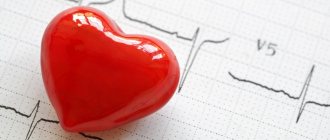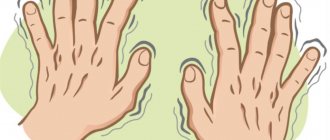Numbness is an abnormal sensation that can occur in any part of the body, but is most often felt in the arms and legs. The symptom of numbness is often accompanied by tingling, and can be quite harmless, for example, in the hands when cooling, to a sign of a serious, life-threatening condition. Numbness is a fairly common symptom. Numbness of the limbs is often accompanied by an emotional context with a feeling of detachment and decreased emotional coloring, which is usually a sign of depression. In a physical context, numbness is usually the result of damage, poor circulation, or pathological changes to certain nerves.
In addition, there may be periodic attacks of numbness and tingling due to the presence of certain health problems, such as neuroses or a migraine attack. Also, episodes of numbness can occur during attacks of fear caused by the anticipation of life-threatening events, and in such cases the numbness is caused by shallow breathing and most often affects the fingers and the mouth area.
Numbness of the hands is manifested by a feeling of loss of sensation in the hands; patients often call this condition “asleep” hands. Numbness may be accompanied by a tingling sensation from the needle. Often such numbness occurs after sleeping with your hands under your head. Numbness in the hands is usually caused by carpal tunnel syndrome, which causes compression of the median nerve. Most often, carpal tunnel syndrome is caused by compression of the nerve in the carpal tunnel. In addition, numbness in the hands can be caused by injuries, hypothermia, or systemic diseases such as diabetes. If numbness of the hands is accompanied by shortness of breath, nausea, and palpitations, then this may be a sign of acute, life-threatening conditions and requires emergency medical attention.
Numbness in the legs is a loss of feeling or sensation in the legs, resulting from disruption of communication between the peripheral nerves and the central nervous system. Typically, numbness in the legs is associated with poor circulation in the lower extremities. This numbness most often occurs when sitting cross-legged for a long period of time. In such cases, getting up and walking can relieve the numbness after a while. But numbness in the legs can also be a sign of serious damage to nerve fibers due to mechanical factors (disc herniation, radiculopathy) or nerve damage due to somatic diseases.
Causes
Numbness can be a sign of a wide range of diseases or conditions that involve restricted blood flow or nerve damage.
Temporary numbness can be caused by any activity that puts prolonged pressure on the nerve(s), such as sitting cross-legged or cycling long distances. Numbness can also occur due to moderate to severe orthopedic or vascular pathology, as well as conditions and diseases that lead to damage to the nervous system. In some cases, numbness is a symptom of a life-threatening condition that requires emergency medical attention.
Cardiovascular causes of numbness
Numbness can be caused by a lack of blood flow to a certain area due to conditions such as:
- Arteriovenous malformations
- Buerger's disease
- Deep vein thrombosis (a blood clot in the legs can break off, which can lead to pulmonary embolism in the lungs, heart attack, stroke)
- Frostbite
- Diseases of peripheral arteries (vascular atherosclerosis, in which narrowing of the arterial bed occurs).
- Raynaud's syndrome, in which persistent spasm of peripheral vessels occurs and blood circulation in the distal extremities is impaired. Vasospasm is usually triggered by cold or sometimes stress.
Orthopedic causes of numbness
Numbness may also occur due to minor or serious orthopedic conditions that cause nerve damage:
- Whiplash neck injury
- Bone fractures
- Carpal tunnel syndrome
- Degenerative diseases of the intervertebral disc
- Herniated disc
- Compression pinched nerve
- Osteoporosis
Neurological causes of numbness
Numbness due to nerve compression or nerve damage may be due to conditions such as:
- Alcoholism
- Brain tumors
- Diabetic neuropathy
- Encephalitis
- Heavy metal poisoning such as lead poisoning
- Hypothyroidism
- Multiple sclerosis
- Peripheral neuropathy
- Spinal cord injury or tumor
- Stroke
- Systemic lupus erythematosus
- Myelitis
- Myelopathy
- Vitamin B12 deficiency
Numbness during pregnancy
Pregnant women face many changes in the body, and numbness is one of them. Some pregnant women develop carpal tunnel syndrome and it is believed to be due to water retention in the body during pregnancy.
As the fetus develops, fluid accumulates in the body, tissues swell, including in the wrist area, compression of the median nerve occurs and carpal tunnel syndrome develops. Symptoms of carpal tunnel syndrome are more pronounced in the morning hours, as fluid accumulates in the body at night. As a rule, carpal tunnel syndrome in pregnant women heals on its own after delivery.
Numbness in children
There are many reasons why children may experience numbness in different parts of the body. Eating disorders, lack of vitamins and minerals can cause numbness in the lower extremities, this is especially typical for a deficiency of B vitamins. Sports injuries can also cause numbness. Therefore, in childhood, parents need to pay attention to children’s complaints of numbness, which lasts more than a few minutes and may be a sign of damage to ligaments, tendons or bone fractures. Often, anxiety in childhood can be a source of numbness in the lips and face.
Arm pain due to restless legs syndrome
Restless legs syndrome (RLS) is a neurological disease characterized by the appearance of paresthesia (pins and needles sensations), discomfort and other unpleasant sensations, including pain, in the extremities. These symptoms usually occur in the evening or in the first half of the night.
In most cases, RLS is associated with unpleasant sensations in the legs, but already in the first description of this disease, made by Thomas Willis in 1672, it is noted that symptoms can appear not only from the lower, but also from the upper extremities. In a modern test for the presence of this disease (the scale for assessing the severity of RLS), discomfort in both the legs and arms is necessarily assessed.
In some cases, the appearance of evening and night pain in the arms due to restless legs syndrome may be associated with the treatment regimen used. For example, with long-term use of dopaminergic drugs, in 9-30% of cases, the so-called “amplification syndrome” occurs, in which symptoms in the legs can intensify, spread to other areas of the legs and arms, and occur at other times, even in the morning and evening hours. daytime hours.
Symptoms
Numbness usually occurs due to poor circulation in a particular area or nerve damage. Sensory disturbances (numbness) can also be the result of infection, inflammation, trauma and other pathological processes. In most cases, numbness is due to non-life-threatening illnesses, but it can also be a sign of a stroke or tumor.
Numbness in the extremities is often associated with pain or may be accompanied by other sensory disturbances such as burning or tingling. Strokes also cause motor and speech disorders. Depending on the cause, numbness may disappear quickly, for example, numbness in the arm , which occurs when a person sleeps with their head on their arm, disappears after a few movements of the arm. Chronic numbness in a leg or arm over a long period of time usually indicates some level of nerve damage, such as due to diabetes or multiple sclerosis. Chronic numbness in the fingers may be due to a pinched nerve, as is the case with carpal tunnel syndrome. In any case, numbness that lasts more than a few minutes merits attention and medical attention. And if a person experiences numbness in the groin area and impaired bladder and bowel function, or there are signs of paralysis, confusion, speech impairment, then in such cases it is necessary to seek emergency medical help.
Symptoms that may accompany numbness:
- Anxiety
- Burning feeling
- Frequent urination
- Increased numbness or tingling while walking
- Itching
- Lower back pain
- Muscle spasms
- Pain in the neck
- Pain in other parts of the body
- Pins and needles sensation
- Rash
- Increased sensitivity to touch
A number of symptoms accompanying numbness may be a sign of serious conditions and this must be taken into account by the doctor, since emergency medical care and necessary medical procedures are often required.
These are the following symptoms:
- Lethargy or momentary loss of consciousness
- Labored breathing
- Difficulty walking
- Dizziness
- Loss of control over voluntary urination or bowel movements
- Visual impairment
- Numbness in the head, neck, back
- Paralysis
- Speech disorders (dysarthria)
- Weakness
Causes of numbness in arms and legs during sleep
If loss of sensation in the arms and legs occurs occasionally, only at night, most likely, there is no talk of a disease. Unpleasant sensations in this case arise due to impaired blood flow. In addition, due to minimal mobility, nerves and tendons can be pinched. Some patients manage to say goodbye to paresthesia without the help of a doctor. To do this, they get rid of negative factors:
- incorrect postures: during a night's rest, it is advisable not to tuck your legs, not to hide your hands under the pillow, or to put them behind your head. Incorrect position disrupts blood flow and causes discomfort;
- Tight clothes: If clothes that are too tight are used as pajamas, problems with blood flow may occur. Unpleasant sensations also appear in those who do not remove jewelry (bracelets, rings) at night. By eliminating tight clothing and jewelry during the night's rest, you can effectively prevent numbness;
- uncomfortable pillow: using too soft or, on the contrary, hard sleeping material, the cervical spine may bend. As a result, blood will flow poorly to the limbs, which is why the legs and arms will begin to numb.
If an uncomfortable pillow and tight clothing are eliminated, but numbness in the arms and legs does not go away during sleep, this indicates health problems. It is noteworthy that sensitivity can disappear not only in the arm, leg, but also in the fingers. In most cases, discomfort is caused by blood flow disturbances of various origins. Numbness can also occur due to diseases of the spine, which are associated with problematic transmission of nerve impulses.
Diagnosis and treatment
Based on the medical history, study of symptoms and physical examination, the doctor prescribes an examination plan, which includes both instrumental and laboratory examination methods.
To treat numbness, first of all, it is necessary to find out the cause of this symptom. If numbness is associated with circulatory disorders, diabetes or multiple sclerosis, the underlying disease is treated, both with the help of conservative treatment methods and surgical methods (for example, for vascular diseases). For orthopedic problems, such as disc herniation, osteochondrosis, treatment can also be either conservative or surgical (for example, when it is necessary to decompress the nerve root).
What to do if your fingers go numb at night?
First, you should try to find the cause of this condition. It is worth analyzing after which this symptom could appear.
Relief from hand numbness not associated with disease
It would seem that if the problem is not illness, why do anything? I woke up, stretched my fingers, and I could continue sleeping. But such awakenings negatively affect the quality of sleep, which means they have direct consequences for the state of the nervous system.
Sometimes, due to numbness in the fingers, adrenaline is released, the pulse rises and breathing quickens - this is how the body tries to deliver blood to the affected part of the body. Such an “emergency” wake-up leaves little chance of being able to immediately fall asleep later.
Some actions should be taken immediately; they will never be superfluous. This applies to the mattress and pillow; if necessary, they should be replaced with more comfortable ones. This will ensure good sleep and give you a better chance of a healthy spine.
An orthopedic mattress and pillow will help solve another problem - incorrect sleeping position.
Sometimes a person takes a sleeping position, trying to get comfortable on an uneven surface. If it has been noticed that this is the case, you need to try to control yourself and at least fall asleep in the right position.
You will also need to reconsider your night wardrobe and replace narrow, tight-fitting and constricting items with more spacious ones. Particular attention should be paid to the width of the sleeves in the forearm area.
If there is no urgent need, it is better to remove jewelry while sleeping and put it in a box. This will not only protect your fingers from numbness at night, but will also prevent the chain or bracelet from accidentally breaking. The caution regarding jewelry also applies to watches with tight straps.
If it’s all about medications for regular use (for example, drugs for hypertension), you should consult with your doctor about prescribing possible analogues. Do not exceed the recommended dosage or combine medications with alcohol. It is better to postpone the consumption of alcoholic beverages, coffee and spicy foods to three hours before bedtime.
It will take an effort of will to unlearn harmful but habitual poses. You can ask your loved ones to remind you of this, because often, when falling asleep, we cross our legs without even noticing it.
If your work involves stress on your neck throughout the day, you need to set aside time to warm up and relax your muscles. For example, make smooth bends forward, backward and to the sides, or “write” the numbers one to nine with your nose in the air: first holding your head straight, then turning it in one direction and the other. After this, knead and rub your neck yourself. This will restore impaired blood flow and relax the muscles.
If the load is unusual, you should work without fanaticism: stop, rest and periodically stretch your neck. In the evening, relax your muscles under a warm shower and rub with some warming ointment.
What happens when your hands become numb?
Hand numbness is associated with loss of sensation in one or both limbs. It covers the entire hand, moving onto the tissues of the hands and fingers. Numbness should not be confused with paralysis, which results in the arm not moving. In a paralyzed person, sensation may be lost or partially preserved.
Along with numbness, the patient feels a tingling or burning sensation in the affected area. These sensations are called parasthesias. More often than not, they precede the fact that your hands feel numb at night or at the moment of waking up. Unpleasant sensations quickly pass if caused by external causes associated with a decrease in air temperature. The sudden appearance of parasthesias and their slow progression are noted.
Chronic conditions are associated with some degree of nerve damage. Therefore, the hand goes numb during sleep. And, if this process occurs every night, you need to urgently consult a doctor. Seek medical help if accompanied by numbness, confusion of consciousness, speech, or weakness in the affected arm.
Sometimes parasthesias are combined with the appearance of pain radiating to the shoulder, dizziness, and increased blood pressure.
General principles of treatment
The main goal of treating finger joints is to eliminate the cause of numbness. Conservative methods are usually used in therapy. Patients are prescribed medications to improve blood circulation, and visits to physiotherapeutic and massage procedures are recommended. If discomfort is caused by osteochondrosis, then patients are advised to wear Shants collars to stabilize damaged cervical discs and vertebrae.
Drug treatment
When prescribing medications, the doctor takes into account the type of pathology that caused numbness in the hands. So, to reduce sugar levels, long-term use of hypoglycemic drugs is required. For endocrine diseases, treatment regimens include drugs that normalize the functioning of the endocrine glands. But there are medications that are almost always used for sensitivity disorders:
- antiplatelet agents, vasoactive agents - Curantil, Clopidogrel, acetylsalicylic acid;
- drugs to improve blood circulation - Pentoxifylline, Eufillin, Xanthinol nicotinate;
- preparations with B vitamins - Combilipen, Milgamma, Neuromultivit;
- balanced complexes of vitamins and microelements - Vitrum, Centrum, Selmevit.
Warming ointments and gels are actively used in treatment: Capsicam, Finalgon, Viprosal, Nayatox. They improve blood circulation, eliminate swelling, pain and numbness.
Surgery
If conservative therapy is ineffective or the underlying pathology recurs, surgical treatment is performed. If the numbness is caused by compression of the nerve by a hematoma or tumor, they are usually removed endoscopically. This method of operation is also used for carpal tunnel syndrome. The doctor excises the broad ligament, which limits the space of the canal where the median nerve passes.
Surgical treatment of cervical osteochondrosis consists of removing the herniated intervertebral disc and decompressing the spinal canal. The most commonly performed procedures are microdiscectomy, laser disc reconstruction, or puncture valorization.
Exercises
To restore blood circulation in the hands, strengthen muscles, ligaments, and tendons, patients are recommended to perform special exercises 1-2 times a day. The treatment complex is compiled by a physical therapy doctor, taking into account the severity of the underlying pathology. The following exercises are most effective for numbness in the hands at night:
- imitation of playing the piano;
- abduction and adduction of the thumb;
- clenching and unclenching fists;
- rotation with brushes.
For exercise, you can purchase expanders and massage balls with soft protrusions-spikes on the surface. When they are compressed, the muscles of the fingers, wrist and even the elbow joint are simultaneously strengthened.
ethnoscience
Before using folk remedies, you should consult your doctor, as some of them may distort the effect of pharmacological drugs. To eliminate numbness, ointments, compresses and applications with warming, distracting and locally irritating properties are used. They are prepared according to the following recipes:
- ointment. In a mortar, mix a tablespoon of thick honey, gum turpentine, and almond cosmetic oil. Add 100 g of Vaseline in small portions, transfer the ointment to a jar, store in the refrigerator;
- compress. 2 large leaves of horseradish are crushed until smooth, add a tablespoon of kefir. Apply to the hands for an hour, fix with film and gauze bandage.
Applications are used in folk medicine to improve blood circulation. Paraffin or ozokerite (sold in pharmacies) is melted in a water bath and cooled to a comfortable temperature. Apply the thick mass to the brushes in several layers for 1 hour.
Why does my left hand go numb?
If the left hand goes numb, this means that it is urgently necessary to pay attention to the state of the person’s cardiovascular system and undergo a full examination in a specialized medical institution, since numbness of the left hand, the causes and treatment of this condition must first of all be determined exclusively by a doctor -cardiologist. The thing is that any sudden change in the condition of the left hand, occurring during the day or at night, when for no apparent reason, for example, the hand becomes numb and hurts, the finger (thumb, little finger, etc.) pulls and numbs, aching pain is felt throughout the entire hand, may indicate serious heart problems, even a mini-stroke or pre-infarction condition .
In the case where the left hand goes numb due to a micro-stroke , it would not be superfluous to undergo an MRI or other similar studies to confirm or refute such a diagnosis with subsequent therapy. If the left arm goes numb due to a pre-infarction condition , and the patient has heart pain, he must immediately be prescribed a course of treatment to prevent a heart attack using appropriate medications, and also be advised what to do in the future to prevent such situations.
Another reason why the left arm is lost may be a number of neurological problems and metabolic disorders. So, due to a deficiency in the body of vitamins from groups A and B, damage to the membrane of nerve fibers is observed, accompanied by a loss of their sensitivity.
If a person’s fingers on his left hand are numb for this reason, he should replenish the lack of vitamins in the body as quickly as possible.
Diagnostic methods
Since hands can go numb at night for various reasons, it is difficult to make a primary diagnosis only on the basis of an external examination and patient complaints. Functional tests are required to assess sensitivity, tendon reflexes, and muscle strength. A number of instrumental studies are prescribed:
- radiography in two projections;
- MRI of the spine;
- Dopplerography of the vessels of the head and neck.
In diagnosis, myelography, evoked potentials, electroneurography, electromyography, ECG, ultrasound of the abdominal organs, thyroid gland, and heart can be used. Using the results of biochemical and general clinical studies, it is possible to detect endocrine pathologies, hypo- and hypervitaminosis, and metabolic disorders.
Why do my legs go numb?
In principle, all of the above causes of numbness in the hands can also lead to similar symptoms in the lower extremities. For example, Raynaud's disease and polyneuropathy mainly affect the toes, especially the little toe and big toe. With pathologies of the cardiovascular system, in particular stroke , the left leg goes numb, and with diseases of the spine, both limbs hurt or the leg on the right is lost.
It is worth noting here that the lower extremities are primarily affected by intervertebral hernias and other problems localized in the lumbar region, and not in the cervical region, as is the case with the upper extremities.
Left-sided neuralgia of the sciatic nerve will lead to pain in the left leg, and its right-sided inflammation will answer the questions of what causes the pain and why the right leg is numb.
Also, don’t discount the shoes in which modern people spend quite a lot of their working and free time. Most often, the toes and the cushion under them hurt when wearing high-heeled shoes, and the heel hurts when wearing squashed sneakers or boots. In this matter, the experts, of course, are women, who often put the beauty and attractiveness of their feet above the convenience and practicality of shoes.
The question of what to do with numbness of the lower extremities and how to treat sore legs should be approached individually, and in case of constant and severe pain, be sure to consult a doctor.










